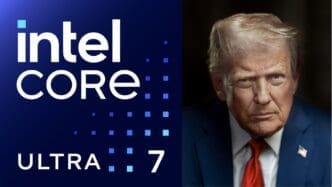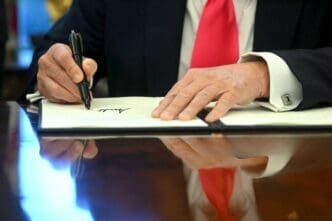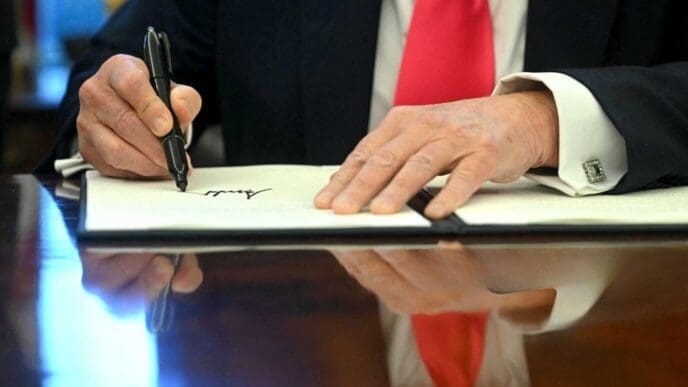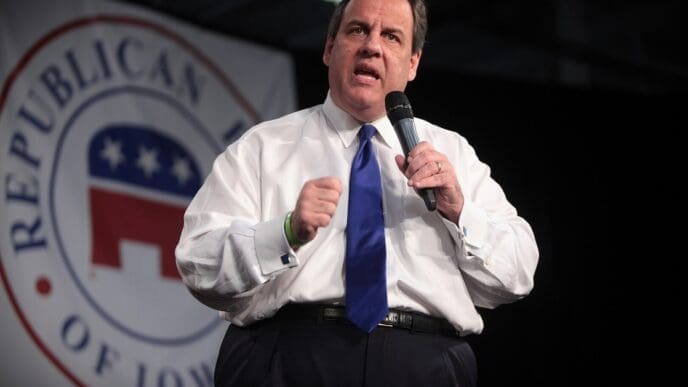Executive Summary
- The Wall Street Journal’s editorial board sharply criticized President Trump’s administration over its plans for the U.S. government to acquire a 10 percent equity stake in Intel and a proposed tax on patents.
- The Journal argued these moves represent an unprecedented embrace of government ownership for a Republican president, potentially stifling innovation and hindering Intel’s ability to compete.
- President Trump defended the Intel deal, describing it as “great” for the chip manufacturer and highlighting the U.S. acquired valuable shares without cost.
The Story So Far
- The Wall Street Journal’s sharp criticism of President Trump’s administration over its proposed 10% equity stake in Intel and a potential patent tax stems from the editorial board’s view that these moves represent an unprecedented embrace of government ownership for a Republican president, departing from traditional principles and potentially stifling innovation. This current dispute also occurs within a broader context of ongoing friction and consistent criticism from the publication towards Donald Trump’s administration.
Why This Matters
- The Trump administration’s proposed 10% equity stake in Intel and a potential patent tax are viewed by The Wall Street Journal as an unprecedented embrace of government ownership for a Republican president, raising concerns that these actions could establish a problematic precedent for state intervention in private industry, stifle innovation, and hinder corporate competitiveness in critical sectors like chip manufacturing.
Who Thinks What?
- The Wall Street Journal’s editorial board sharply criticized President Trump’s administration, arguing that the proposed 10 percent equity stake in Intel represents an unprecedented embrace of government ownership for a Republican president and that a patent tax would stifle innovation.
- President Trump lauded the Intel deal as “great” for the chip manufacturer, highlighting that the U.S. “paid nothing for these Shares” and they are now valued at approximately $11 Billion Dollars.
The Wall Street Journal’s editorial board has sharply criticized President Trump’s administration over its plans for the U.S. government to acquire a 10 percent equity stake in Intel, alongside a proposed tax on patents. The board argued Monday that such moves represent an unprecedented embrace of government ownership for a Republican president and could stifle innovation.
Editorial Board’s Concerns
The Journal’s editorial stated that it would have been “hard to imagine a Republican President demanding government ownership in a private company.” They further warned that the administration was “toying with a tax on patents,” which they equated to “a tax on innovation.”
While acknowledging that federal support might temporarily strengthen Intel’s finances, the Journal countered that there is a significant risk. The editorial board suggested that government direction could hinder Intel’s ability to compete effectively in chip manufacturing and design.
The newspaper’s board contended that deals like the one with Intel would “empower the administrative state.” They warned that such actions could establish a problematic precedent for future government involvement in private industry.
Trump’s Stance on the Deal
President Trump, however, lauded the Intel deal, describing it as “great” for the chip manufacturer. In a social media post, he highlighted that the U.S. “paid nothing for these Shares, and the Shares are now valued at approximately $11 Billion Dollars.”
Proposed Patent Tax
Regarding the proposed patent tax, the Journal pointed out that companies already pay taxes on royalties and income from patented products. The board questioned the Commerce Department’s legal authority to impose such a tax, noting that “Congress hasn’t authorized such a patent tax.”
Broader Relationship with the Trump Administration
This criticism comes amidst a period of ongoing friction between The Wall Street Journal and the Trump administration. The publication has been consistently critical of Trump during his second term, and the president previously sued the Rupert Murdoch-owned outlet earlier this year concerning its reporting on his alleged connections to Jeffrey Epstein.
The Wall Street Journal’s editorial board has voiced strong opposition to the Trump administration’s proposed equity stake in Intel and a potential patent tax, framing these initiatives as a departure from traditional Republican principles and a threat to corporate independence and innovation. The debate highlights differing views on the appropriate level of government intervention in the private sector.














